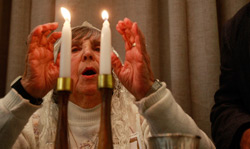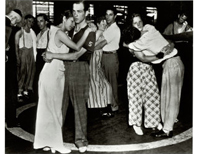 If you are in anyway a “foodie” you know the words “local and sustainable.”
If you are in anyway a “foodie” you know the words “local and sustainable.”Jamie Oliver is a British Chef who is very much part of the local and sustainable movement. He is also an upstander who has changed the nature of the food served in British State Schools, opened a restaurant where he trains and employs at risk teenagers, and in a reality TV show – Jamie Oliver’s Food Revolution – has come to America to try to teach American’s about healthful eating.
His first season was in Huntsville, Alabama – the most overweight city in America – where he made some significant impacts on school lunches among other things. This year he came to Los Angeles and was pretty much defeated by the local ennui. His one big accomplishment was to get the Los Angeles School district to agree to remove flavored milks. Flavored milks (common practice in American public schools) are seen “as the only way to get kids to drink milk” have three times the sugar content of most soda and are probably significantly responsible (with other villains like pizza and fast food) for the dramatic escalation of diabetes in children.
Last year I wrote a probably incoherent tweet about Jamie Oliver being a fabulous role model for Jewish education—having the fortitude and skill to induce people to do what is right even if it isn’t the easiest or most fun choice.
Recently I sat at a conversation to discuss the future of the complementary school. I don’t know what the complimentary school is except that it is the hip-term now used by federated culture to indicate what most Jewish parents describe as “Hebrew School” and “Sunday School.” It joins Religious Schools, Religion Schools, Supplementary Schools, Torah School and Congregational schools in the list of euphemisms for what started life as the Talmud Torah.
All I can figure out is that a complementary school is a place where you get a lot of positive feedback. I hope it doesn’t mean that we are an accessorizing secular education.
Among the people participating in this discussion of the future of majority Jewish schooling was the local communal camp director. His comment was: “We had a school group out to camp for a retreat and at the end of the year the school voted the camp experience their favorite experience of the year.”
Chocolate and Strawberry milk always score highly when students evaluate their food choices.
Let me make two things absolutely clear:
- I am NOT saying that camp and camp-style learning present a clear danger the way that flavored milks do, and
- I am NOT saying that schooling should not be “fun,” but, I will continue to quote the mission statement drafted by the Brookline High School faculty, “We believe that education is an addiction to the tart and not the sweet.” (Quoted by Tom Peters in A Passion for Excellence.)
By “local” I mean, that Jewish education should take place within the dynamic of a living Jewish community. Judaism that cannot be lived can’t be all that functional. Likewise, those who teach should be part of that Jewish community. This does not mean that one can only hire members to be teachers—BUT RATHER—communities need to work hard at making faculty feel invited to participate.
By “sustainable” I am meaning that Jewish Education should lead to future Jewish living. It is impossible for me to define what is adequate learning to sustain Jewish life. For me, it includes a lot of text literacy and tools for “making-meaning” out of primary Jewish sources. These are the tools to remix the Jewish tradition. But, I am more than willing to admit that adequacy has a lot to one’s definition of Jewish living.
I fully believe that the community built at a camp retreat is a useful and highly functional expression of the community that creates “local,” but I doubt that it transfers a lot of sustainability. I know that you can’t teach until you have engaged. That makes engagement necessary, critical, and probably achievable, but it isn’t sufficient to the task of continuity.
We no longer live within the physics of “if you teach them they will come” but I can’t support reduction past the point of sustainability just to achieve demographics. My tradition teaches me that sha’ar yashuv. We will be sustained by a surviving remnant.
Unflavored milk is best for kids even when it isn’t their first choice.
Cross-posted from The Gris Mill















